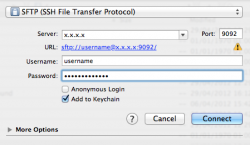RE: yes, got that, and thanks...
Hi torid110,
Yup, got that part too. That's why I had asked Kilamite about the sshd_config file, this is the file (old style -- more on this in a moment) that resets the port on the sshd daemon so that the machine is also listening on the non-standard port.
Your link made me realize that I may be using the older Linux version of ssh/sshd, as I'm a relatively new convert to Mac OSX from Linux, and indeed I am using the Linux utilities and not the Mac OSX ones. (I change my ports the old Linux way, which I just retested. And then I switched from the Linux utilities to the Mac OSX OpenSSH utilities, and these are controlled by the ssh.plist. I changed the port on my machines using the ssh.plist so that also works when using the Mac OSX default OpenSSH routines.) Thanks so much for pointing out this link...it didn't cross my mind that I was still using the Linux utilities, although I probably should have remembered this, but I set this up in 2010 and it just hadn't occurred to me.
Thanks again, much appreciated,
Switon
P.S. So, Kilamite, the upshot of this is that you need to make sure that your CyberDuck is altering the ssh port correctly (I assume that CyberDuck is doing the correct thing, but who knows). I don't know how CyberDuck sets its ssh/sshd ports, but you might try reverting to the Mac OSX ssh utilities and testing them by changing their ports using the /etc/services and /System/Library/LaunchDaemons/ssh.plist way. I checked both the old Linux way using Linux utilities that I had downloaded and built, and this worked; and I also checked the Mac OSX OpenSSH utilities using the ssh.plist and /etc/services, and this way also worked --- so you can use non-standard ports for ssh either way. The only thing left to do is for you to make certain that your CyberDuck ssh is also changing the ports correctly. Maybe you have to reboot your machine after changing the port in CyberDuck in order to restart the CyberDuck ssh daemon?
P.P.S. So now the question is, when the next OSX update comes along, 10.8.3(?), will it overwrite ssh.plist or will it do the proper "merge", keeping the non-standard port numbers? I assume that it will do the proper "merge", the way Linux distros do. But if non-standard ssh ports stop working after an upgrade, we'll have to remember to check this.



